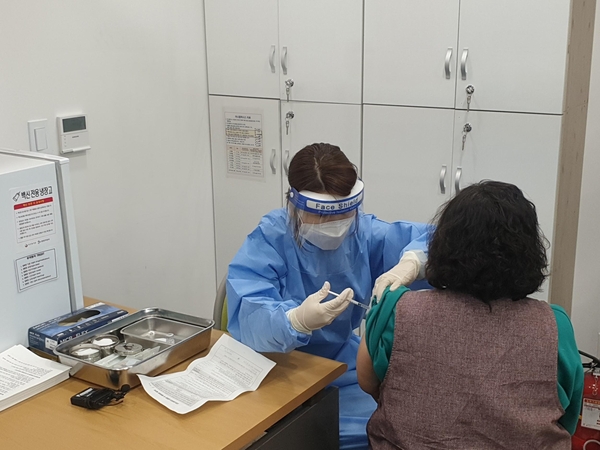Input 2021.02.26 10:59 | Revision 2021.02.26 11:04

Hwang, who entered the public health center wearing an apron with the phrase’Iam Nursing Home’, measured her body temperature before vaccination. Later, at the vaccination precautionary office, he talked about his health status and allergic reaction history on the same day, and after confirming the availability of vaccination, he received the vaccine at the vaccination room. The health center staff signaled that it was “a little tingling,” and then inserted a needle into the left arm.
After receiving the vaccination, Hwang moved to the adverse reaction observation room and held the timer in his hand. Immediately after the vaccination, the blood pressure is measured and the chair is placed a certain distance and sits for 30 minutes to check for adverse reactions. He said, “It’s about the same level of pain as a regular vaccination, and there’s no reaction even after the injection.”

From that day on, vaccinations using the AstraZeneca vaccine began simultaneously for 285,480 people, including hospitalized, residents, and workers under the age of 65 at 5803 nursing hospitals and nursing facilities nationwide. 5,266 residents and workers in 213 nursing homes nationwide are eligible for vaccination on this day.
There was also a lot of interest in the’No. 1 vaccinationists’ in each autonomous district in Seoul about vaccination, the first step in ending the corona. When opinions diverged over the selection of the first inoculation, the government and the quarantine authorities did not specify the first inoculation in Korea and started vaccinations for each local government.
On that day, President Moon Jae-in also visited the Mapo Health Center and watched the scene of the vaccination of Kim Yun-tae, 60, a doctor at Nexon Children’s Rehabilitation Hospital, who was the first to get the vaccine. President Moon also observed receiving vaccinations from Occupational Therapist Lee Jeong-seon (32), an occupational therapist at the Specialized Nursing Center for the Elderly in Seoul.
Seodaemun-gu was selected as the first candidate for vaccination, Kim Hee-cheol (57), the former Seodaemun Elderly Care Center. Seodaemun-gu explained that workers at high-risk facilities who cared for elderly people with weak immunity were selected as the first candidates for vaccination.
Gangseo-gu also secured an amount of vaccine that could inoculate 600 people, and started vaccinating coronavirus at a nursing facility in Banghwa-dong on the 26th. Eligible subjects are workers under the age of 65 and residents at 22 nursing homes in the area.
AstraZeneca vaccination will be started for 1,558 people under the age of 65 who are hospitalized, inhabited, and workers in elderly group facilities such as nursing hospitals and nursing facilities in Seongbuk-gu. Seongbuk-gu conducts self-inoculation from the 26th at 7 nursing hospitals in the city where medical staff reside. From the beginning of next month, the Seongbuk-gu public health center will provide vaccinations to 16 nursing facilities.
According to the Seoul Metropolitan Government, about 6.60 million people, over 70% of Seoul citizens over the age of 18, will be vaccinated sequentially by the end of October, before the influenza epidemic season. A total of 96,000 people are eligible for phase 1 vaccination in Seoul from February to March. 137 nursing hospitals and 227 nursing facilities in Seoul will be vaccinated against 22,615 people, including those under the age of 65 hospitalized, residents, and workers. From the 27th, vaccinations will begin for workers in hospitals that directly treat corona patients.
